Best Noise-Canceling Headphones for Writers: Enhance Focus and Creativity
Mastering Special Occasion Speeches: Your Guide to Toasts, Eulogies, and Beyond
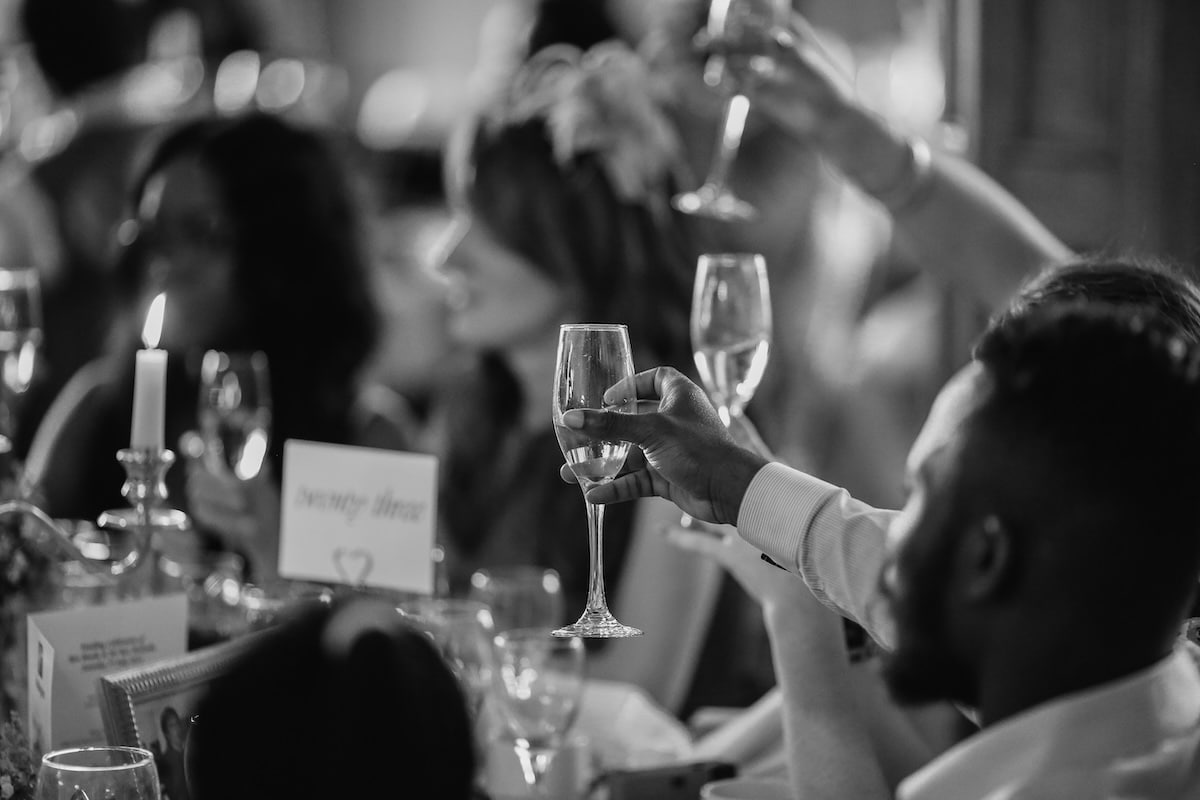
Have you ever been asked to “say a few words” at a wedding, retirement party, or memorial service? If so, you've been tasked with delivering a special occasion speech—an opportunity that can be both an honor and a source of anxiety.
But fear not! This comprehensive guide will walk you through everything you need to know about special occasion speeches, from understanding their unique purpose to crafting memorable toasts and delivering heartfelt eulogies.
What Makes Special Occasion Speeches Different?
Special occasion speeches stand apart from other forms of public speaking. Unlike informative or persuasive speeches that aim to educate or convince, special occasion speeches are designed to commemorate, celebrate, or honor a specific moment, achievement, or person.
These speeches occur during commemorative occasions, unveilings, commencements, dedications, and eulogies. These moments offer rare opportunities for displaying tact and good sense in handling occasion, theme, and audience.
What truly distinguishes special occasion speeches is the concept of appropriateness. Your approach must align perfectly with the event's tone and purpose—knowing when to be serious and when to celebrate.:
- Dignified or colloquial
- Soaring or rambling
- Fiery or soothing
- Instructive or amusing
Neglecting to consider these contextual elements is like writing a speech that won’t resonate with your audience.
Types of Special Occasion Speeches: From Toasts to Tributes
Special occasion speeches come in many forms, each with its own conventions and expectations:
- Celebratory Toasts – Brief, uplifting speeches often accompanied by a raised glass
- Commemorative Addresses – Speeches honoring significant events, achievements, or milestones
- Eulogies – Solemn tributes to someone who has passed away
- Award Presentations – Speeches recognizing achievements before presenting an award
- Acceptance Speeches – Gracious acknowledgments when receiving recognition
- Roasts – Good-natured, humorous speeches poking fun at someone (in appropriate contexts)
- Dedications – Formal speeches marking the opening or dedication of places or objects
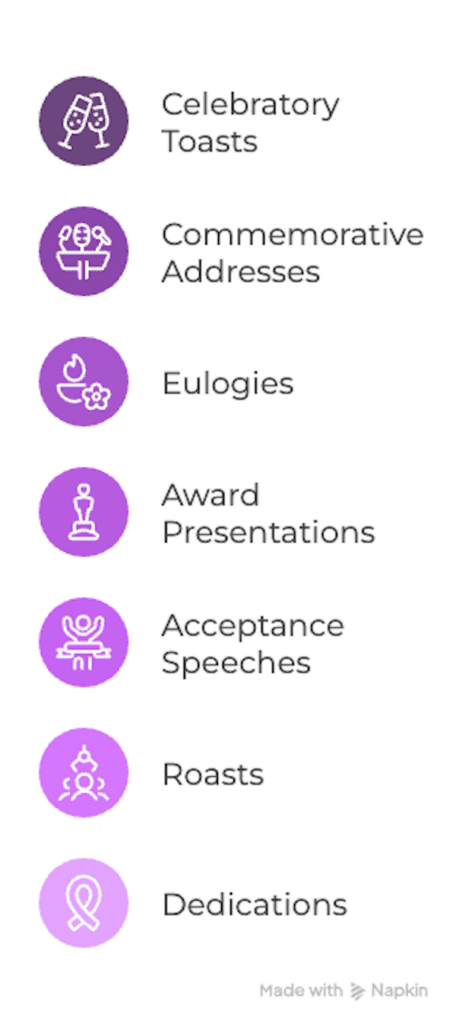
Each type requires different approaches, but all benefit from preparation and understanding your audience.
Crafting the Perfect Toast: The Art of Celebration
Toasts are perhaps the most common special occasion speech many people deliver. Whether at a wedding, retirement party, or milestone birthday, a well-crafted toast can be memorable for all the right reasons.
Key Elements of Effective Toasts:
- Brevity – The best toasts rarely exceed 2-3 minutes. As historical speeches like Lincoln's Gettysburg Address demonstrate, powerful rhetoric often comes in small packages, characterized by “integrity, brevity, and simplicity.”
- Personal Connection – Share a brief, relevant anecdote that illuminates the character or achievements of the person being honored.
- Appropriate Humor — Tasteful humor is welcome for most toasts, especially at celebrations like weddings or retirements. As one speaking expert notes, after-dinner speeches in particular benefit from humor “suited to” the specific occasion.
- Sincerity – Authentic emotion resonates more than elaborate language. Be genuine in your praise and well-wishes.
- Universal Conclusion – End with a sentiment everyone can support, typically by raising a glass and offering a wish for the future.
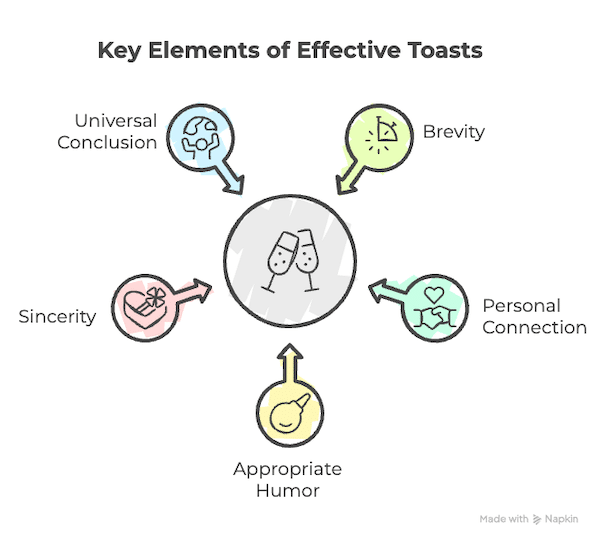
Toast Speech Structure Example:
Introduction: Brief greeting acknowledging the occasion Personal Connection: “I've known Sarah for 15 years, and there's one story that perfectly captures her spirit…”
Meaningful Anecdote: Brief, relevant story illustrating the honoree's character
Heartfelt Wish: Sincere expression for the future.
Call to Action: “Please join me in raising a glass to Sarah and her next adventure!”
Delivering Eulogies: Speaking with Dignity and Grace
Perhaps the most challenging special occasion speech is the eulogy—a tribute to someone who has passed away. Unlike celebratory toasts, eulogies require dignity, sensitivity, and emotional control.
Guidelines for Meaningful Eulogies:
- Honor the Deceased's Character – Focus on qualities, values, and contributions that defined their life.
- Share Illustrative Stories – Choose anecdotes that capture their essence rather than simply listing achievements.
- Acknowledge Grief While Offering Comfort – Recognize the collective loss while providing perspective and hope.
- Maintain Composure – Practice extensively to manage your emotions, especially during particularly moving passages.
- Speak to All Mourners – Remember that your audience includes people who knew the deceased in different contexts.
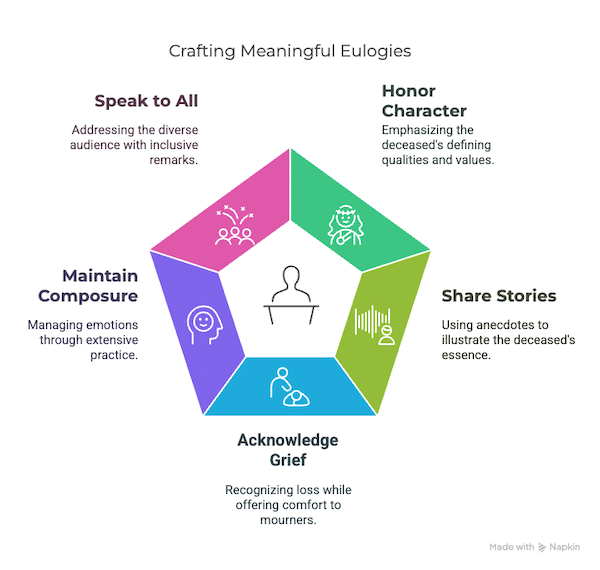
According to speaking experts, these solemn occasions demand a different approach than lighthearted events like roasts. Here, appropriateness means respecting the gravity of the moment while still celebrating a life well-lived.
Preparing for Any Special Occasion Speech: Your Pre-Speech Checklist
Regardless of the specific type of special occasion speech you're delivering, thorough preparation is essential. Here's a practical checklist to guide your planning:
1. Study the Occasion
Ask yourself these critical questions:
- What is the object of the gathering?
- How important is it to the audience?
- How large will the audience be?
- What sort of people will be present?
- How large is the venue?
- Who selected me to speak?
- Who else is speaking and on what topics?
- Precisely how long am I expected to speak?
- Who speaks before and after me?
2. Gauge the Appropriate Tone
Different special occasion speeches require different approaches:
- Celebratory events like weddings → warmth and optimism
- Professional recognitions → respect and admiration
- Memorial services → dignity and compassion
- Roasts → good-natured humor (but only when appropriate)
3. Focus on a Central Theme
Even in brief special occasion speeches, having a central message provides coherence. Consider:
- What one sentiment do you want to leave with the audience?
- How can you support this theme with brief examples or stories?
- What quotation or original thought might crystallize your message?
4. Practice Delivery
Special occasion speeches often carry emotional weight. Practice helps manage those emotions while ensuring you:
- Maintain appropriate eye contact
- Speak at a measured pace
- Project your voice to reach the entire audience
- Use natural gestures that enhance your message
Learning from the Masters: Historical Special Occasion Speeches
Some of history's most memorable addresses were special occasion speeches. Lincoln's Gettysburg Address—just 272 words delivered at a cemetery dedication—demonstrates the power of being “simple and true” while using “the fewest possible words.”
Similarly, Martin Luther King Jr.'s speeches combined “integrity, brevity, and simplicity” with the significance of the moment to create “golden rhetoric.” These historical examples remind us that special occasion speeches don't need to be long to be impactful—they need to be resonant.
Common Pitfalls to Avoid in Special Occasion Speeches
Even experienced speakers can stumble when delivering special occasion speeches. Watch out for these common mistakes:
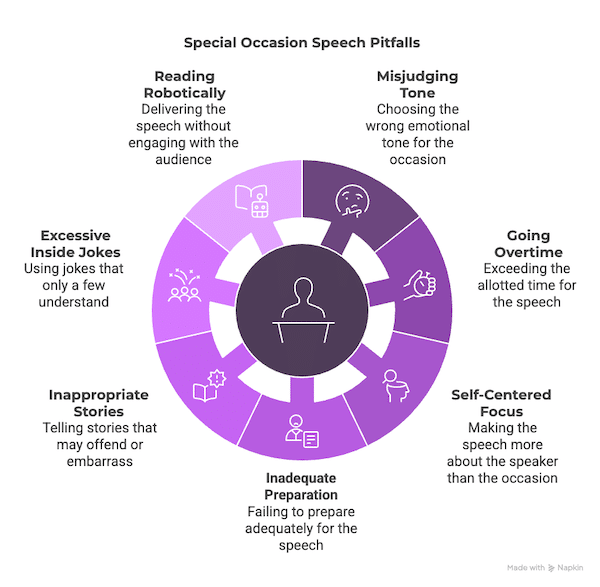
- Misjudging the Tone – Using humor at a solemn occasion or being overly formal at a casual gathering
- Going Overtime – Few things undermine an otherwise good speech like running too long
- Making It About You – Remember who or what is being honored (hint: it's usually not the speaker)
- Inadequate Preparation – “Winging it” rarely works, even for short speeches
- Inappropriate Stories – Consider whether your anecdotes might embarrass or offend
- Excessive Inside Jokes – Ensure your remarks connect with everyone present
- Reading Robotically – Notes are fine, but maintain a connection with your audience
Taking Your Special Occasion Speeches to the Next Level
If you want to develop your special occasion speaking skills further, consider:
- Joining Toastmasters – Toastmasters will provide you with many opportunities to get comfortable speaking in front of audiences, large and small. If you join and progress in their speaking curriculum, there are manuals that include specific sections on “SPECIALTY SPEECHES” and “SPECIAL OCCASION SPEECHES,” with instructions on mastering “the toast, speaking in praise, delivering a ‘roast,' presenting awards, and accepting awards.”
- Recording and Reviewing – With permission, record your special occasion speeches to identify strengths and areas for improvement.
- Studying Great Examples – Watch recordings of excellent, memorable occasion speeches, noting what makes them effective.
- Seeking Feedback – Seek honest feedback on your delivery and content from trusted friends or colleagues. Joining Toastmasters can also be helpful, as it offers the opportunity to receive unbiased feedback from a diverse group of members who may provide insights that your friends cannot.
The Lasting Impact of Special Occasion Speeches
Special occasion speeches may be brief, but their impact can be lasting. When delivered with an understanding of the occasion, audience, and appropriate tone, these speeches mark significant moments in people's lives with dignity, humor, or inspiration, depending on what is needed.
Remember that the key to a successful special occasion speech lies not in elaborate language or lengthy presentations but in knowing what the moment requires and responding authentically and appropriately. Your words matter—make them count.
Ready to improve your special occasion speaking skills? Check out our favorite books on public speaking, as well as our favorite online courses on public speaking.
Yes! I want Bad Grammarian updates and promotions!
No Spam Zone. We will never spam or sell your email address!
Yes! I want Bad Grammarian updates and promotions!
No Spam Zone. We will never spam or sell your email address!


